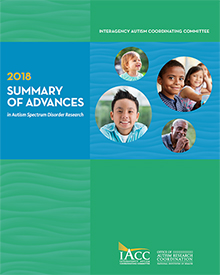- For Immediate Release
Thursday, April 11, 2019 - Contact: Office of Autism Research Coordination/NIH
Email: IACCPublicInquiries@mail.nih.gov
2018 Summary of Advances Spotlights Autism Research Advances

The Interagency Autism Coordinating Committee (IACC) has released its 2018 Summary of Advances in Autism Spectrum Disorder (ASD) Research. This publication provides lay-friendly summaries of studies representing the top 20 advances in ASD research, as chosen by members of the Interagency Autism Coordinating Committee (IACC). The 20 selected articles address topics that span all 7 question areas of the 2016-2017 IACC Strategic Plan for ASD. Advances provided new insight into potential screening tools for ASD, the development of brain regions implicated in ASD symptomatology, and the prevalence of ASD in children. The advances also include studies that analyzed the degree of inclusion of children severely affected by autism in treatment studies, the effect of insurance ASD mandates on health service use, and the manifestation of ASD symptoms in adolescents and young adults. In addition to the 20 selected studies, the 2018 Summary of Advances lists all articles nominated by IACC members. The 2018 Summary of Advances meets the requirements of the Autism Collaboration, Accountability, Research, Education, and Support (Autism CARES) Act of 2014.
***
The IACC is a Federal advisory committee that was created by Congress in an effort to accelerate progress in ASD research and services. The IACC works to improve coordination and communication across the Federal government and work in partnership with the autism community. The Committee is composed of officials from many different Federal agencies involved in autism research and services, as well as adults on the autism spectrum, parents and family members of individuals on the autism spectrum, advocates, researchers, providers, and other public stakeholders. The documents and recommendations produced by the IACC reflect the views of the Committee as an independent advisory body and the expertise of the members of the Committee, but do not represent the views, official statements, policies or positions of the Federal government. For more information on the IACC, please visit: iacc.hhs.gov.


